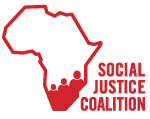
SJC members inspect RR Section for Health & Safety threats, seen here with a local Enviromental Health Office (EHO) Official
On 8 April 2010 SJC members accompanied Laurence Grootboom – Functional Operations Manager for the City’s Water and Sanitation Department – on a visit to an area of RR section long afflicted by an overflowing sewerage line. This followed numerous efforts by the SJC over the preceding six weeks to have the problem rectified, and a meeting a week earlier with the Mayor of Cape Town and other City officials in which it was raised.
The manhole has been leaking raw sewage around – and at times directly through – local resident Noaskile Thethayuthi’s home for well over a year. Her three infant children are ill with diahorrea on a weekly basis on the account of having to live and play amongst raw sewerage. The flow of sewerage is also directed over a standpipe which hundreds use daily for water, and over the doorsteps of many of Noaskile’s neighbours.
There are at present 240 toilets used by 3000 households in RR Section. National norms and standards dictate that there should be 5 households per toilet, but the ratio in RR section is over 12 households to one toilet. Moreover, many of these toilets are unusable as a result of irregular (often non-existent) maintenance on the part of the city.

Sewerage flows through the community, over a drinking water site, and into wetland in RR Section
The chronic lack of refuse facilities can also contribute to the sewer line becoming blocked. Residents are often faced with the choice of living with rotting waste in their homes, or “dumping” and clogging the already insufficient sewerage facilities. Residents are often forced to use materials such as cardboard and plastic instead of toilet paper, which is then flushed down the toilet. When the sewer is blocked the pumped sewage rises, floods the manholes and spills dangerously into the living area of people like Noaskile. This is not only a violation of her and others family’s right to dignity, but also of their right to health and safety.
Upon visiting Noaskile’s home and witnessing the voluminous grey puddles of sewage Grootboom acknowledged that the situation was “totally unacceptable”. He pledged his personal assistance in the matter. Days later a team arrived and attempted to unblock the sewer system. While this undoubtedly improved the situation, the manhole still overflows on a daily basis and a combination of raw sewage and human waste including toilet paper, tampons and condoms is left to gather in the narrow pathway that separate homes.
The SJC have relayed this information back to Mr Grootboom and other City officials. Comprehensive and urgent action is required to eradicate this problem and provide Noaskile and people like her with the level of service that they are entitled to.
We are most disappointed that almost a month after the site visit, the problem still exists (albeit somewhat less severe). The SJC will continue campaigning City officials and organising and educating communities until people like Noaskile are able to live in decent conditions, with their constitutional rights to health, safety and dignity ensured.

Noaskile Thethayuthi with her three children and a neighbour, standing on the makeshift zinc sheet bridge she built to cover the constant flow of sewerage




